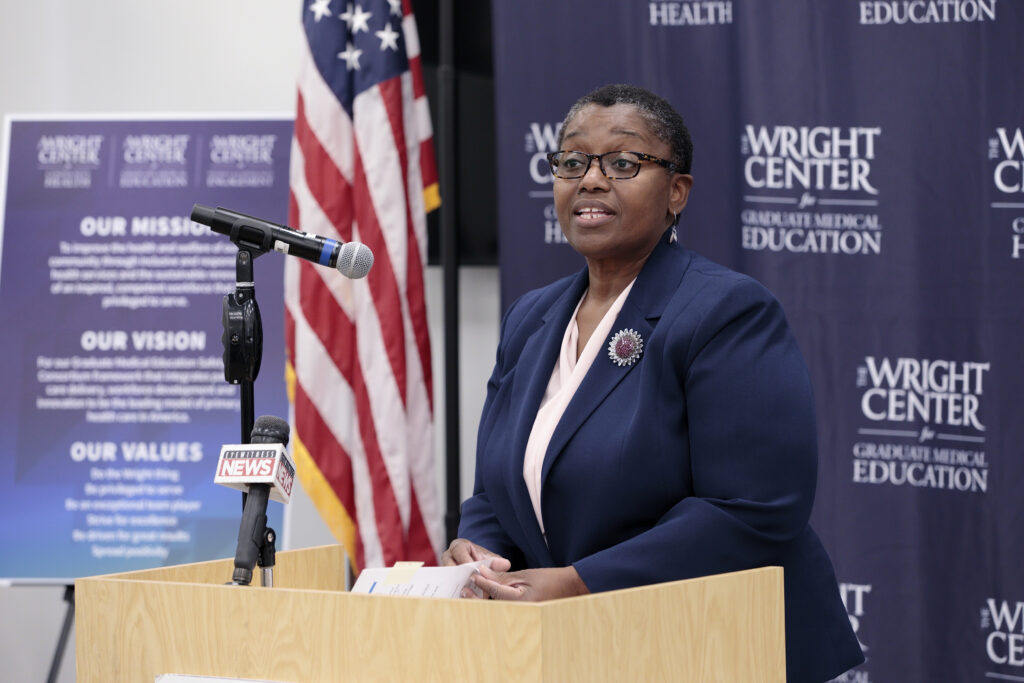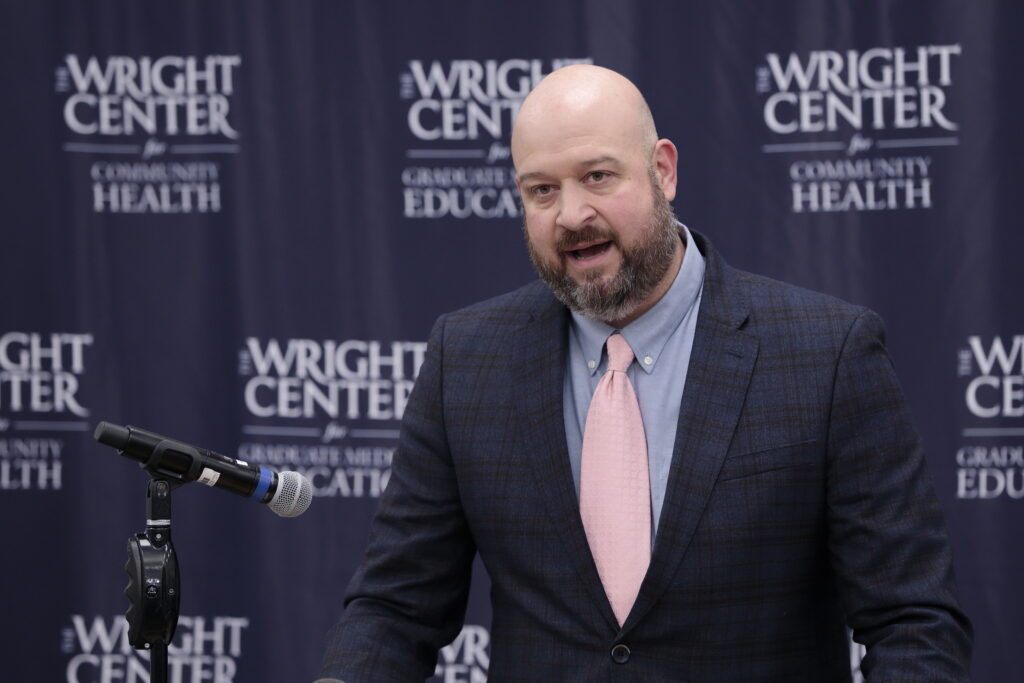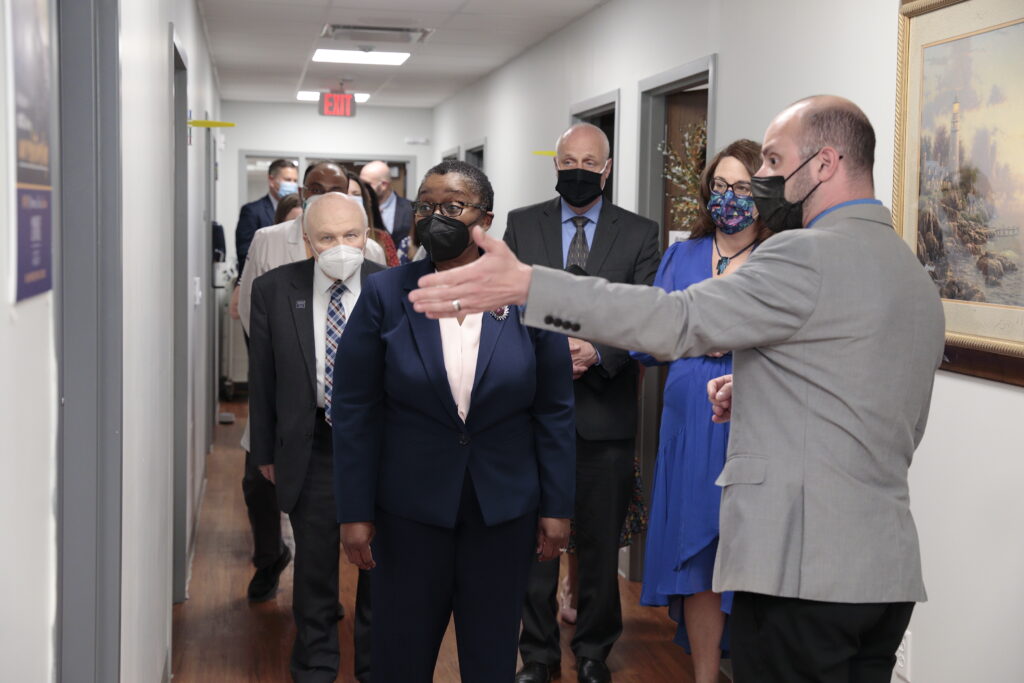News
Acting Secretary of Health tours the Scranton Practice
Discusses effectiveness of syringe service programs for harm reduction

Pennsylvania Department of Health Acting Secretary and physician general Denise Johnson, M.D., FACOG, FACHE, delivers remarks at a press briefing held at the Scranton Practice.
The Pennsylvania Department of Health’s Acting Secretary and physician general visited The Wright Center for Community Health, an Opioid Use Disorder Center of Excellence, on Wednesday, May 11 to discuss syringe service programs and the important role they play in the drug treatment process.
The visit included a private roundtable discussion, tour of the primary care and Ryan White HIV/AIDS clinical space and a press briefing with regional print and broadcast media at the Scranton Practice. Denise Johnson, M.D., FACOG, FACHE, was joined by Steven Ross, state Department of Drug and Alcohol Programs (DDAP), Scranton Mayor Paige Cognetti, delegates from the offices of state Representatives Kyle Mullins and Thom Welby, Dr. Linda Thomas-Hemak, president and CEO of The Wright Centers, and other executive leadership.
“Thanks to syringe service programs already in Pittsburgh and Philadelphia, many Pennsylvanians have found their bridge to treatment and social services,” Dr. Johnson said. “We want to reduce the number of drug overdose deaths. We need to use every tool at our disposal and the success of existing programs is evidence that residents across the state could experience better health outcomes if more syringe service programs are available.”

Scott Constantini, associate vice president for Primary Care and Recovery Services Integration at The Wright Center for Community Health, talks about the benefits of syringe service programs during the press briefing.
‘We are proud to be a part of the progress that has been made in our community, but we still have much work to do together to expand the services, support and compassion for people who use drugs.’
Scott Constantini
AVP, Primary Care and Recovery Services Integration The Wright Center for Community Health
Nationwide, syringe service programs are also associated with a significant reduction in injection-related HIV and Hepatitis C.
“It is more vital than ever that we bridge the divide between mental health and substance use disorders that still exist,” said Ross, the special assistant to the secretary of DDAP. “By offering harm reduction options like syringe service programs, we can meet people who use drugs where they are and work to address the conditions of their drug use.”
Scott Constantini, associate vice president for Primary Care and Recovery Services Integration at The Wright Center for Community Health, added that people who use a syringe service program are five times more likely to receive treatment for their substance use disorder and three times more likely to stop using drugs.
“For over 25 years, I’ve had the opportunity to be a part of individuals’ recovery journeys through the delivery of comprehensive behavioral health support,” Constantini said. “This perspective has opened my eyes to the real barriers, determinants and stigma that people in recovery are faced with every day.
“We are proud to be a part of the progress that has been made in our community, but we still have much work to do together to expand the services, support and compassion for people who use drugs,” he added, during the press briefing.
Multiple studies show that access to clean syringes reduces HIV, hepatitis B and C transmission and other blood-borne pathogens in people who inject drugs. Syringe service programs also increase public safety and protect law enforcement and first responders by properly disposing of used syringes.
Pennsylvania Gov. Tom Wolf’s administration has worked with members of the General Assembly to develop Senate Bill 926 and House Bill 2264, which would allow additional organizations outside of Pittsburgh and Philadelphia to engage in this work.

Shane Cobert Fuller, director of HIV and preventive services at The Wright Center for Community Health, provides a tour of the Scranton Practice to state and local officials.








